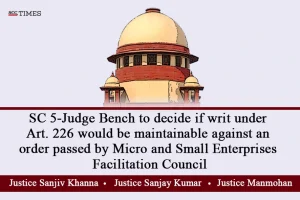Supreme Court: While considering the instant matter wherein the Court had to consider whether a writ petition under Article 226 of the Constitution would be maintainable against an order passed by the Micro and Small Enterprises Facilitation Council (MSEFC) in exercise of power under Section 18 of the Micro, Small and Medium Enterprises Development Act, 2006 (MSMED Act) and if yes, then under what circumstances; the 3-Judge Bench of Sanjiv Khanna, CJ*., Sanjay Kumar and Manmohan, JJ., deemed it fit to refer the matter to a larger bench of 5 Judges. The Court identified the following issues to be determined by a larger Bench:
-
Whether the ratio in India Glycols Limited v. Micro and Small Enterprises Facilitation Council, Medchal — Malkajgiri, 2023 SCC OnLine SC 1852, that a writ petition could never be entertained against any order/award of the MSEFC, completely bars or prohibits maintainability of the writ petition before the High Court?
-
If the bar/prohibition is not absolute, when and under what circumstances will the principle/restriction of adequate alternative remedy not apply?
-
Whether the members of MSEFC who undertake conciliation proceedings, upon failure, can themselves act as arbitrators of the arbitral tribunal in terms of Section 18 of the MSMED Act read with Section 80 of the A&C Act?
The Court clarified that the 1st and 2nd question will subsume the question of when and in what situation a writ petition can be entertained against an order/award passed by MSEFC acting as an arbitral tribunal or conciliator.
Background:
Tamil Nadu Cements Corporation Limited (TANCEM) is a wholly owned undertaking of the Government of Tamil Nadu. For the units at Ariyalur, TANCEM had called for tender on 27-01-2010 on turnkey basis for design, supply, erection and commissioning of two Electrostatic Precipitators for clinker coolers at a total contract value of Rs.7.50 crores under the provisions of Tamil Nadu Transparency in Tenders Act, 1998 and the Tamil Nadu Transparency in Tenders Rules, 2000. On 16-4-2010, TANCEM issued a work order in favour of Unicon Engineers for design, supply, erection and commissioning of two ESPs for clinker coolers at Ariyalur Cement Works on turnkey basis for the total value of Rs.7,50,60,543/- as per drawing and specification mentioned in tender documents. It was stated that Unicon Engineers failed to deliver on its promise to build and commission the ESPs as undertaken.
Several warning letters were issued by TANCEM to Unicorn Engineers for delay in execution of civil works; furthermore, TANCEM sent a letter indicating the deadline to finish the works and raised concerns over the substandard quality of work done for the ESPs, which on inspection were found not to be in accordance with the contractual stipulations.
Along with a slew of several litigations and claims between the parties, TANCEM preferred the instant petition before the Supreme Court.
Court’s Assessment:
Perusing the issues involved in the instant petition, the Court observed that Division Bench of the Supreme Court in Jharkhand Urja Vikas Nigam Limited v. State of Rajasthan, (2021) 19 SCC 206 had held that MSEFC is obliged to conduct conciliation for which the provisions of Sections 65 to 81 of the Arbitration and Conciliation Act, 1996 would apply, as if the conciliation was initiated under Part III of the said Act. Under Section 18(3), when conciliation fails and stands terminated, the dispute between the parties can be resolved by arbitration. The Council is empowered either to take up arbitration on its own or to refer the arbitration proceedings to any institution as specified in the said section. It is open to the Council to arbitrate and pass an award, after following the procedure under the relevant provisions of the A&C Act, 1996, particularly Sections 20, 23, 24 and 25.
However, the Court also observed that Gujarat State Civil Supplies Corporation Limited v. Mahakali Foods Private Limited (Unit 2), (2023) 6 SCC 401, did not take note of Jharkhand Urja Vikas Nigam Limited (supra) observed that the specific non-obstante clauses in of Section 18(1) and (4) of the MSMED Act have the effect of overriding any other law for the time being in force, including the A&C Act, and, consequently, the MSEFC can act as a conciliator, and thereupon itself take up the dispute for arbitration or refer it to any institution or centre for such arbitration.
The Court further took note of India Glycols Limited v. Micro and Small Enterprises Facilitation Council, Medchal — Malkajgiri, 2023 SCC OnLine SC 1852, held that a writ petition under Articles 226/227 of the Constitution was not maintainable as Section 18 of the MSMED Act provides for recourse to a statutory remedy for challenging an award under Section 34 of the A&C Act and that too would require a deposit in terms of Section 19 of the A&C Act.
Perusing Sections 15 to 18 of MSMED Act, the Court opined that there is a direct confrontation between the judgment of the two Judges Bench of Supreme Court in Jharkhand Urja Vikas Nigam Limited (supra) and Gujarat State Civil Supplies Corporation Limited (supra). The Court also expressed its reservations on the dictum in India Glycols Limited (supra).
The Court explained that the instant matter is a case of statutory arbitration that is mandatory. It is possible to argue that it bars a party from moving to the Court of law under Section 9 of the Code of Civil Procedure, 1908. Section 18 also overrides the principle of party autonomy when they enter into an arbitration agreement which prescribes the procedure for the appointment of an arbitrator and conduct of arbitral proceedings. The statute further prescribes an undoubtedly high rate of interest.
“The issue therefore which arises and needs consideration is whether there would be an absolute and complete bar to invoke writ jurisdiction under Article 226 of the Constitution even in exceptional and rare cases where fairness, equity and justice may warrant the exercise of writ jurisdiction”.
Analysing the writ jurisdiction of the High Court under Article 226 of the Constitution, the Court pointed out that the access to High Courts under Article 226 is not just a constitutional right, but it is also a part of the basic structure of the Constitution. “This is an inalienable right and the rule of availability of alternative remedy is not an omnibus rule of exclusion of the writ jurisdiction, but a principle applied by the High Courts as a form of judicial restraint and refrain in exercising the jurisdiction”. The Court also pointed out that it is a well settled law that in certain contingencies, the writ Courts may exercise their writ jurisdiction despite the availability of alternative remedy.
“Noticeably, the MSEFC as a statutory authority performs a statutory role and functions within the four corners of the law”.
Henceforth, with the aforesaid analysis and noticing the conflicting dictums of the Division Bench of the Supreme Court in the afore-stated referred cases, the Court therefore deemed it fit to refer the issues to a 5-Judge Bench.
CASE DETAILS
|
Citation: Appellants : Respondents : |
Advocates who appeared in this case For Petitioner(s): For Respondent(s): |
CORAM :


